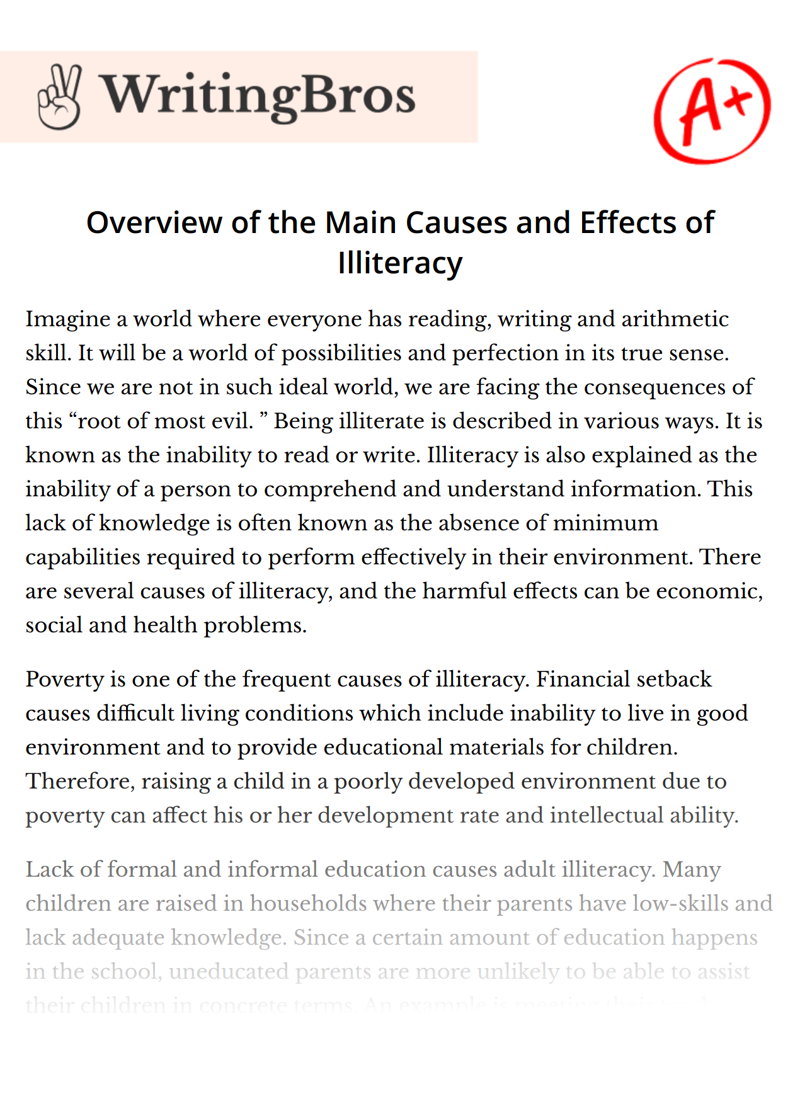Overview of the Main Causes and Effects of Illiteracy

Imagine a world where everyone has reading, writing and arithmetic skill. It will be a world of possibilities and perfection in its true sense. Since we are not in such ideal world, we are facing the consequences of this “root of most evil. ” Being illiterate is described in various ways. It is known as the inability to read or write. Illiteracy is also explained as the inability of a person to comprehend and understand information. This lack of knowledge is often known as the absence of minimum capabilities required to perform effectively in their environment. There are several causes of illiteracy, and the harmful effects can be economic, social and health problems.
Poverty is one of the frequent causes of illiteracy. Financial setback causes difficult living conditions which include inability to live in good environment and to provide educational materials for children. Therefore, raising a child in a poorly developed environment due to poverty can affect his or her development rate and intellectual ability.
Lack of formal and informal education causes adult illiteracy. Many children are raised in households where their parents have low-skills and lack adequate knowledge. Since a certain amount of education happens in the school, uneducated parents are more unlikely to be able to assist their children in concrete terms. An example is meeting their teachers and talking about their children’s academic performance. Uneducated parents tend to have lower expectations and aspirations regarding education for themselves and their children. Poor households place work ahead of education. Illiterate parents find it difficult to read to their children or encourage a love of learning. Whenever uneducated adults improve their knowledge skills, this has a flow-on effect to their children because having these new skills enables them to be able to help a child with homework read notes and correspondence sent home from school. This could put both the individuals and their coworkers at risk. It also increases the need and cost of medical services and leads to higher absenteeism, and damage work efficiency.
Basic literacy and numeracy skills are usually needed to achieve knowledge as individuals with strong basic literacy and numeracy ability combined with advanced functional knowledge are valuable human capital to their nations and the world economy. Lack of family support causes illiteracy when a child experiences difficulty writing or reading due to dyslexia. Without family’s support and understanding of the child’s condition, the child may be termed “a dullard”. As a result, they may not go the extra mile to help the child overcome the challenges.
Child labor causes illiteracy. When children focus more on making money to support their parents, it affects their time for school work. Some become uneducated adults, without formal education nor technical skill. When they get tired of menial jobs, they become more likely to be on welfare or unemployment benefits having dropped out of school or being unable to find a good job. This puts a heavy burden on the social security system of any nation. Therefore, it is very important that adult literacy programs are encouraged. Illiteracy also leads to low self-esteem which can lead to isolation.
Social barriers like restrictions on girl child education causes illiteracy. Some families, even in the United States, limit the level of education their female children can get. While the girl child is able to get high school diploma due to free high school education, the parents are reluctant to sponsor the child to college. This discrimination is based on traditional and religious beliefs. Lack of awareness causes illiteracy, in health-related situations. This significantly limits an individual’s ability to access, understand and apply health-related instructions and messages. For example, illiterate mothers may be face issues with administering multiple prescriptions for themselves or their children.
Reading skills are necessary for distinguishing each prescription from the next and for reviewing prescription instructions. literate people tend to demonstrate better hygiene practices. Illiteracy also increases the likelihood of high-risk sexual behavior because of the lack of knowledge about sexual and reproductive health. It also leads to unawareness of contraceptive methods which increases the likelihood of unplanned and adolescent pregnancy. Improving literacy skills is a key first step in overcoming the obstacles that lock individuals into a cycle of poverty and disadvantage.
Education is the best means of overcoming poverty. Eliminating the poverty will reduce illiteracy, thereby minimizing the effects of illiteracy. The earlier we boost efforts on eliminating other causes of illiteracy like lack of family support, social barriers, and child labor, the better we are able to minimize the adverse effects like crime, low self-esteem, high unemployment rate, drug abuse et cetera.
Cite this Essay
To export a reference to this article please select a referencing style below

